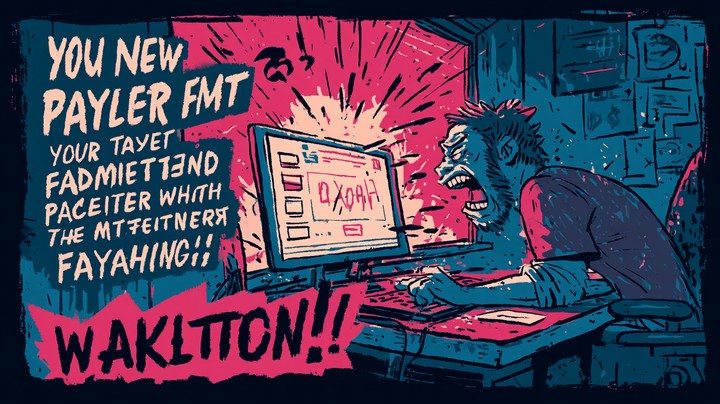Kill The Technician!

Most micropreneurs I know come from a technical background. That’s not surprising. The vast majority of one-man businesses rely, especially at the beginning, on the technical skills of the owner. However, when we transition from freelancers to entrepreneurs, we need to kill the technician inside us and let other voices have a say in the business.
The Technician, The Manager, And The Entrepreneur
One of the most interesting business books I’ve read lately is The E-Myth Revisited: Why Most Small Businesses Don’t Work and What to Do About It (phew! what a title). While in my opinion, the book stretches two concepts forever and repeats the same ideas over and over again, these two concepts are very powerful. one of them clearly describes the most common problem solopreneurs face, especially at the beginning of their entrepreneurial career.
“The problem is that everybody who goes into business is actually three-people-in-one: The Entrepreneur, The Manager, and The Technician.”
So, who are these people, and why is that a problem? Do I suffer from a multiple-personality disorder?
Not at all 🙂
The entrepreneur is the visionary and the dreamer in you. The one that lives in the future and seizes all the opportunities.
The manager lives in the past. He is the pragmatic, orderly you. The one who likes to organize and plan everything.
The technician is the worker, the one who loves getting his hands dirty. There’s work to be done, and she knows nobody else is going to do it.
When we are starting our entrepreneurial journey, almost inevitably the technician is confidently on the steering wheel. The other guys rarely turn up, and so the approach to the business consists of working, working and working.
And that’s the problem. A business that’s run by the technician alone is doomed to failure. I know it from my own experience.

Why? What’s Wrong With The Technician?
As Michael E. Gerber puts it:
“There’s nothing wrong with being a Technician. […] It’s only a problem when The Technician consumes all the other personalities. When The Technician fills your day with work. When The Technician avoids the challenge of learning how to grow a business. And when The Technician shrinks from the entrepreneurial role so necessary to the lifeblood, the momentum, of a truly extraordinary small business, and from the managerial role so critical to the operational balance or grounding of a small business on a day-to-day basis.”
I can state that this is true from my own experience. When you come from a strong technical background as in my case, you feel comfortable working on the technical aspect of the business. On the here and now.
The management job is boring and you would rather get back to your code or your designs. The entrepreneurial job is scary and you don’t even know where to start.
Work, Work, And More Work
Thus, your approach to the business is working on a product you’ll sell later. You spend countless hours working on your first prototype, without a clear idea of how the business is going to operate, who are your customers, or how to find them.
If during that process the other guys express their concerns about not having customers, market research or a clear document of how the process will work, more often than not, the technician feels threatened and responds aggressively with more work.
So the other guys retreat, hoping that when the work is done they will have their chance.
However, work never ends. There’s always more work to do. Days, weeks, months pass by and you are still working on a product with no market, no customers, no organization and no plans for the future.
Then, some months later, you release your first version of the product, put together a marketing campaign and… nothing happens. You blame a poor product and silence that voice telling you that you should have double-checked that there was a market first. However, if you are a stubborn technician -as in my case- you decide that the product needs some polishing, after which everybody will love it just as much as you do.

You Are Many Technicians
Of course, when you are a freelancer, you need to wear a lot of different hats. You need to look for customers, do the accounting, your professional work, put together a website where you show your portfolio and perhaps some testimonials, etc.
Sometimes you outsource the tasks you are not proficient with or hire VAs or web developers, but most of the business is you.
That means that your work is what keeps the business going.
However, when you want to transition to micropreneur and start a business, you need to change your mindset. You may still think of the business as essentially you, but that’s wrong. Not only wrong, but it will bind you to your company, so effectively you will have a job, not a business. You will be working in your company, not on your company.
It’s easy to fool yourself thinking that you are doing a lot on your business. Most freelancers are used to be designers, developers, marketers and support staff at the same time. However, that’s just different aspects of being a technician. Or, to put it another way, the different technicians in you, all well prepared and ready to work.
That does not mean that the other guys (the entrepreneur and the manager) don’t work. It’s just that they understand that a business is not just building a product.
Why The Technician Alone Is Bad News For A Business
First of all, you should not even start a business if you have no business at all! That means you should first have a market, a very well defined group of potential clients or leads willing to pay for your services, and yes, at least one customer. Then, and only then, you can consider building a product.
In that scenario, the technician starts the house from the roof. She tries to build a product to solve a need and attract customers, without really knowing if there are customers interested in that product, or having that need in the first place.
What’s worse, the technician is not very good at organizing things long-term, because that’s boring. So, when you have a product, you have no infrastructure to turn it into a viable business.
You don’t know who is going to take care of doing the different parts of the business, or who is going to give support to your customers while you are doing other things, or what’s going to happen if suddenly your business starts to grow and you need more people.
Hence, it’s time to kill the technician…

How To Kill The Technician
Here, “kill the technician” doesn’t mean you have to stop being a technician altogether. The technician adds a lot of value to any business. She is the one who builds the product after all.
However, you should let the others speak, especially at the beginning, when the business is just an idea in your mind.
Let The Entrepreneur Talk: Find A Market With A Real Problem
The entrepreneur needs to clearly define the vision of the idea. Furthermore, the entrepreneur is the one who should propose the business idea. That’s because the entrepreneur does not start with an idea of a product, fall in love with it, and then try to build a business around it.
In fact, the entrepreneur works the other way around. She identifies a need in a market she knows already, or she detects a business opportunity in a specific niche of people and decides to build a business -not a product- around it.
The entrepreneur falls in love with the business, not with the product. In fact, the product is a hassle for the entrepreneur because it’s something that separates the business from the customers, and needs to be built, which takes time and money.
This is why this is the one that should be talking first. The one that should kickstart the business. Don’t ever let the technician do this.
You may think that there’s no entrepreneur in you. But that’s not true. You have been developing her since you became a freelancer and had to get your act together to promote your services and attract customers. She may be a little shy to show up, but she’s there.
Let The Manager Talk: Turn Your Business Into A Viable, Reproducible Flow
Nobody likes to manage things, I get it. However, if you start a business, you need to
You need to let the manager talk.
And the manager is going to tell you that you should write a document specifying how your business works, beginning to end: How you attract new customers, how they sign up with you and how’s the onboarding process. Who takes care of what. What happens if something goes wrong. How a normal business day looks like at the company.
The manager will also make sure that things are going according to plan. She will keep your customers and task updated and under control, and check the reports about marketing expenses and results. She will speak with the suppliers and customers, at least until she can find someone who does it. And then, she will take care of managing these people.
The manager falls in love with the operation of the business. She enjoys having everything under control and verifying that the business flows as it’s supposed to.
Thus, the manager is also an essential part of the business as soon as the entrepreneur has defined it. She will let you know how to make it work.
Even if you think management tasks are boring, the best way to enjoy being the manager is understanding that what you are doing is giving you peace of mind by making everything is ready and planned beforehand. And then regularly checking that everything progresses according to the vision of the entrepreneur.
Let The Technician Talk… When Appropriate
Of course, the technician should have a say in the business too. She is the one who knows how to build the product after all.
Once the entrepreneur and the manager have had their chance of defining the business and its operational structure, once there’s a viable business running with eager customers willing to be served -and pay for it- it’s time to let her talk.
However, you still need to keep her under control. Her way of approaching the business will be something like: “Ok guys, you have had your chance of doing that metaphysical business mumbo-jumbo. Now it’s my time to do some real work, let’s work, work work work!”.
No.
If you want to build a business, not a job, stop her right there. The technician needs to know that she is going to lend a hand initially while there’s no chance of hiring developers, designers, marketers, lawyers, etc. But she needs to know that you want to build a business, not a job.
The difference between both is clear. In a business, the company and you are separate entities. Ideally, what you want to build is something that doesn’t rely 100% on you. Otherwise, you will be building a job. One that won’t be able to scale. Nothing wrong with that, but freelancing is easier, more rewarding, and better paid.

A Question Of Balance
In the end, it’s all a question of balance. During the lifetime of your project, it’s important to give each of these guys enough time to shine on their respective roles.
Especially at the beginning, when the business doesn’t even exist, and it’s only in its defining stage, the entrepreneur needs to be the one speaking aloud. She is defining the market and the image of the business.
Then, when the market is clearly defined, the idea has solidified in a realistic opportunity, the manager needs to take the lead and create a structure that can work and scale. She is defining the architecture of the business, not the product.
Finally, it’s time for the technician to propose a solution that matches the vision of the entrepreneur and the architecture of the manager. Maybe at the beginning, that will imply the technician working a lot on the project, or maybe you will hire someone else to do the dirty stuff.
Whatever the case, when everything’s up and running, if you are still going for the solopreneur/micropreneur route, let them all speak when appropriate. Don’t let any of them silence the rest.
Conclusion
In this article, “Kill the technician!”, I discuss a problem that many micropreneurs face when starting a new business, especially when they come from a freelancing/professional background. We tend to approach it as technicians. Hence, we ignore the fact that a business must have a market first, a reproducible business flow next, and then -and only then- a product that serves that market.
Here, I wanted to share some my thoughts on how to avoid this, and overcome this tendency of resorting to working when faced with scary stuff, like actually building the business.




Comments ()